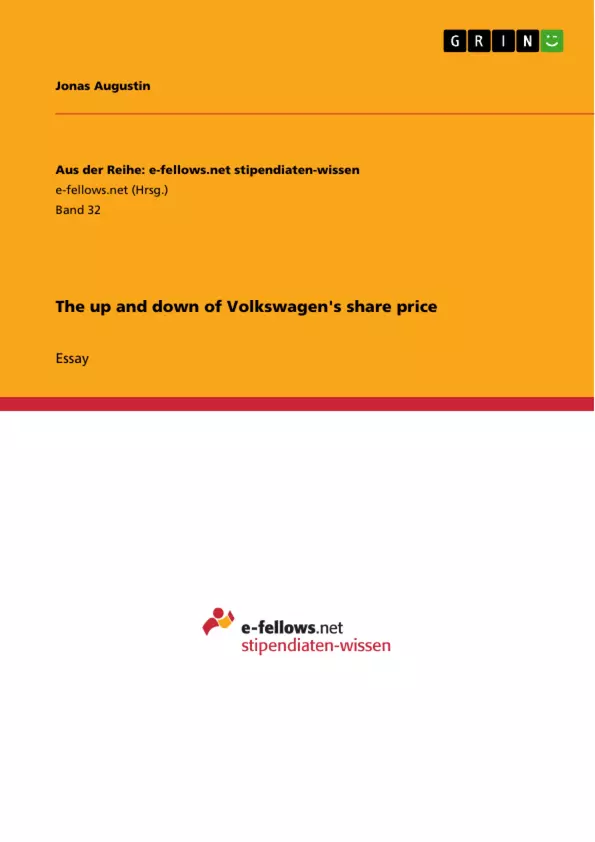Volkswagen is the fourth largest car manufacturer in the world with 6.2 million cars sold in 2007. Although the whole car industry is suffering badly from the current economic breakdown Volkswagen is still doing relatively well standing to its earnings forecast for 2008.
At the moment, Volkswagen is protagonist of one of the largest takeover plans in the car industry. Porsche, a German premium car manufacturer, is trying to acquire the majority in Volkswagen’s stakes. The plans have already been revealed in 2005. However, Porsche does not have the majority stake in Volkswagen yet. It is currently holding 42.6% of the shares as well as options to purchase another 31.5%.
On this background, the Volkswagen share showed an incredible development over the past two months. Its share price rose temporarily to a level where Volkswagen was the largest company in the world in terms of market capitalisation. With a lack of fundamental reasons for this, investors broadly discussed what has happened to the share price. This case study reflects the recent development of Volkswagen’s share price and gives reasons for the absurd rise. Finally, it tries to put these incidents in the context of market efficiency on the stock markets.
Inhaltsverzeichnis (Table of Contents)
- Introduction
- Analysis of the development in Volkswagen's share price
- The aftermath
- Critical Comments
Zielsetzung und Themenschwerpunkte (Objectives and Key Themes)
This case study examines the recent development of Volkswagen's share price, particularly the significant surge in its value. The study aims to provide a nuanced explanation for this dramatic price increase, exploring the role of speculation, market efficiency, and the actions of key players such as Porsche and hedge funds. Ultimately, the analysis seeks to place this event within the broader context of stock market dynamics.
- The impact of Porsche's takeover plans on Volkswagen's share price
- The role of speculation and short-selling in driving price fluctuations
- The concept of market efficiency and the implications of information asymmetry
- The consequences of market inefficiencies and the need for regulatory oversight
- The implications of this case for stock market regulations and index composition
Zusammenfassung der Kapitel (Chapter Summaries)
- Introduction: This section introduces Volkswagen as a major car manufacturer and highlights the context of its current takeover attempt by Porsche. It outlines the significant rise in Volkswagen's share price and the study's objective to analyze the reasons behind this development.
- Analysis of the development in Volkswagen's share price: This chapter focuses on the dramatic price increase of Volkswagen's share, particularly the period from October 26th to 28th, 2008, when the share price almost quintupled. The chapter examines the role of Porsche's takeover plans, the impact of hedge funds and other investors engaging in short-selling, and the resulting market dynamics.
- The aftermath: This chapter explores the consequences of the share price surge, highlighting the substantial profits made by Porsche and the significant losses incurred by hedge funds. It also discusses the public debate sparked by the event regarding market regulation, index composition, and the need for more robust regulatory control.
Schlüsselwörter (Keywords)
This case study revolves around the key concepts of market efficiency, information asymmetry, stock market manipulation, speculation, short-selling, and regulatory oversight. It examines the dynamics of a complex takeover attempt within the context of a volatile stock market, highlighting the impact of individual actors and their decisions on broader market behavior. The study emphasizes the importance of transparency, clear regulations, and effective oversight to ensure fair and efficient market operations.
Frequently Asked Questions
Why did Volkswagen's share price surge dramatically in 2008?
The surge was primarily caused by a "short squeeze." Porsche revealed it held nearly 75% of VW shares, leaving very few shares available for hedge funds to buy back to cover their short positions.
What was Porsche's role in the VW share price rise?
Porsche was attempting a takeover and used cash-settled options to secretly build a massive stake, which caught the market by surprise when revealed in October 2008.
How did Volkswagen briefly become the world's most valuable company?
During the peak of the short squeeze, the share price rose so high that VW's market capitalization exceeded that of ExxonMobil, despite a lack of fundamental economic reasons.
What is market efficiency in this context?
The case study examines whether the stock market was efficient, given that information asymmetry and speculation led to a price that did not reflect the company's actual value.
What were the consequences for hedge funds?
Many hedge funds suffered multi-billion dollar losses as they were forced to buy VW shares at inflated prices to close their short-selling bets.
- Quote paper
- Jonas Augustin (Author), 2008, The up and down of Volkswagen's share price, Munich, GRIN Verlag, https://www.grin.com/document/174202



